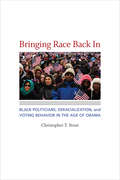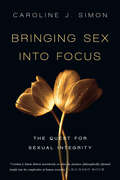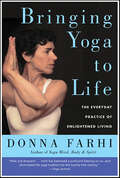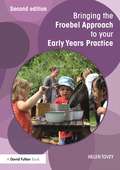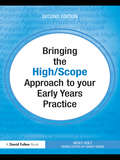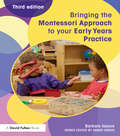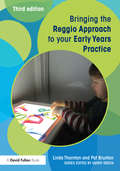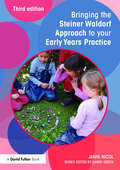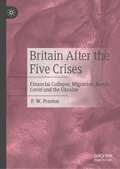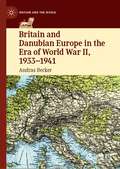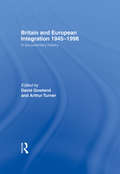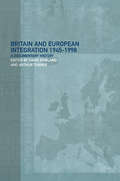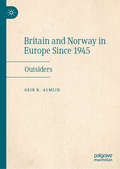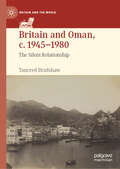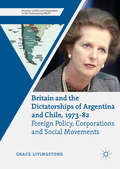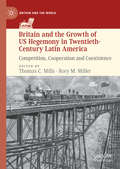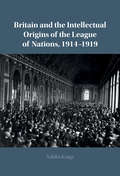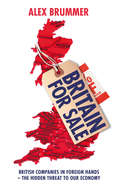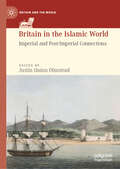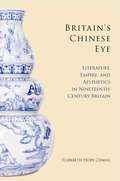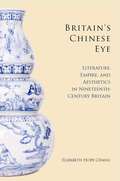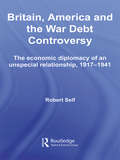- Table View
- List View
Bringing Race Back In: Black Politicians, Deracialization, and Voting Behavior in the Age of Obama (Race, Ethnicity, and Politics)
by Christopher T. StoutBringing Race Back In empirically investigates whether "post-racial" campaign strategies, which are becoming increasingly common, improve black candidates' ability to mobilize and attract voters of all races and ethnicities. In contrast to existing studies, this analysis demonstrates that black candidates who make positive racial appeals (for example, racial appeals that indicate that the candidate will either advance black policy interests or highlight the candidate's connection to the black community without attacking outside political players) not only perform better among blacks; they also improve their standing among Latino voters. Moreover, these appeals do not diminish white voter support. This finding counters conventional wisdom, which suggests that black candidates can succeed in majority white settings only if they distance themselves from the black electorate. Following President Barack Obama's 2008 success, both scholars and the popular media began examining how black candidates address race and racial issues in their campaigns, and scholars and journalists are now exploring whether black voters rally around black candidates who fail to discuss racial issues or who distance themselves from the black community. Bringing Race Back In addresses these issues by using a wide variety of data sources and a number of sophisticated statistical techniques. The study utilizes content analysis of over two thousand newspaper articles on over thirty presidential, U. S. Senate, and gubernatorial elections with African American candidates, in combination with quantitative analysis of state exit polls and U. S. Census voter surveys. In addition to its significant contribution to the scholarship on American politics, African American studies, campaigns and elections, and public opinion, the book also provides valuable insight for political practitioners who want to better understand how deracialized campaigns influence the electability of black candidates in the age of Obama.
Bringing Sex into Focus: The Quest for Sexual Integrity
by Caroline J. SimonIn a culture that includes sex in everything from advertising to climbing the corporate ladder, it's easy to feel fuzzy about the true purpose and place of sexuality. In this book philosopher and ethicist Caroline J. Simon identifies six "lenses" through which people understand sex and sexuality: covenantal, procreative, expressive, romantic, power and "plain sex." Guided by a virtue ethic, she applies those lenses to a variety of sexual scenarios, from flirtation and desire to marital sexuality, helping us to see what filters we run issues of sexuality through and how, properly ordered and weighted, they can help us achieve sexual integrity. Here is a book for anyone interested in developing a holistic, biblical sexual ethic that brings into focus the bewildering array of cultural sexual presentations we're surrounded by every day.
Bringing Yoga to Life: The Everyday Practice of Enlightened Living
by Donna FarhiInternationally renowned and bestselling author Donna Farhi moves yoga practice beyond the mat into our everyday lives, restoring the tradition's intended function as a complete, practical philosophy for daily living. Expanding upon the teachings of Patanjali's Yoga Sutras, the core text of the yoga tradition, Donna Farhi describes yoga's transforming power as a complete life practice, far beyond its common reduction to mere exercise routine or stress management. This is the philosophy of yoga as a path to a deeper awareness of self. Drawing upon her years of teaching with students, Farhi guides readers through all the pitfalls and promises of navigating a spiritual practice. Farhi's engaging and accessible style and broad experience offer important teachings for newcomers and seasoned practitioners of yoga alike. And because her teachings of yoga philosophy extend into every corner of daily life, this book is an equally accessible guide to those seeking spiritual guidance without learning the pretzel bendings of the physical practice itself. As one of the top teachers worldwide, Farhi's exploration of the core philosophy of yoga is destined to become an instant classic.
Bringing the Froebel Approach to your Early Years Practice (Bringing ... to your Early Years Practice)
by Helen ToveyHave you ever wondered about the origins of the kindergarten and the influence of Froebel on early years practice? What did Froebel mean by a garden for children? Why did he believe that play is central in young children’s learning? Bringing the Froebel Approach to your Early Years Practice looks at the founder of the kindergarten and his profound influence on provision and practice for young children today. The Froebelian approach is not a method but includes distinctive principles which shape and guide practice. This new edition has been fully updated in line with the revised EYFS and includes: extra material on using the approach with children of different ages and the role of the adult a discussion of key Froebelian principles such as play, imagination, creativity, learning through self-activity and making connections an examination of block play and how this can be developed in contemporary settings Froebel’s ideas on nature and outdoor play and why these are fundamental to young children’s learning how Froebel used movement, song, rhythm and rhyme to provide key learning experiences With examples of innovative practice and ideas for reflection, this convenient guide will help practitioners and students fully understand what the Froebel approach can offer their setting and children.
Bringing the High Scope Approach to your Early Years Practice (Bringing ... to your Early Years Practice)
by Nicky HoltHave you ever wondered what High/Scope is, where it came from, and how it can be used with young children in your setting? Bringing the High Scope Approach to your Early Years Practice provides an introduction to the High/Scope philosophy and its use in early years. This new edition has been fully updated to show how the High/Scope approach links with the Early Years Foundation Stage and contains new material on working with the under twos. Features include: details about the High/Scope Wheel of Learning an explanation of Active Learning, including materials, manipulation, choice, language and support Plan-Do-Review activities planning and assessment methods. This convenient guide will help Early Years practitioners, students and parents to really understand what the High/Scope approach can offer their setting and children.
Bringing the Montessori Approach to your Early Years Practice (Bringing ... to your Early Years Practice)
by Barbara IsaacsHave you ever wondered what the Montessori approach is all about and how it can be used to benefit the young children in your setting? This book explains how the Montessori approach works offering guidance on planning and assessment methods alongside practical activities for practitioners to try. Throughout there are practical examples involving children of different ages in a wide range of settings to show how Montessori principles have been implemented. . This new edition has been fully updated to include: The revised areas of learning in the EYFS and how these link to Montessori practice An examination of early effective learning Approaches to effective learning in Montessori settings A new chapter on Montessori approaches to the assessment requirements of the EYFSquestions for reflection This convenient guide will help early years practitioners, students and parents to really understand what the Montessori approach means to their setting and children.
Bringing the Reggio Approach to your Early Years Practice (Bringing ... to your Early Years Practice)
by Pat Brunton Linda ThorntonHave you ever wondered what the Reggio Approach is all about, why it works, and how it can be used to benefit the young children in your setting? The book describes how educators in Reggio Emilia work with young children, and looks at the connections between the Reggio Approach and the revised Early Years Foundation Stage framework. It provides practical examples involving children of different ages in a wide variety of settings, helping the reader to see the connection between practice and theory. This new edition has been fully updated to show the increasingly mirroring connections between the Reggio Approach and the principles and commitments of the recently revised Early Years Foundation Stage (EYFS) framework. Each chapter focuses on one important aspect of the Reggio Approach and includes: Practical examples involving children of different ages in a wide variety of settings, helping the reader to see the connection between practice and theory Questions to enable the reader to reflect on and develop his or her own practice in accordance with new statutory requirements References to sources of further reading and information. This convenient guide will help early years practitioners, students and parents to really understand what the Reggio Approach can offer their setting and children.
Bringing the State Back In
by Theda Skocpol Peter B. Evans Dietrich RueschemeyerUntil recently, dominant theoretical paradigms in the comparative social sciences did not highlight states as organizational structures or as potentially autonomous actors. Indeed, the term 'state' was rarely used. Current work, however, increasingly views the state as an agent which, although influenced by the society that surrounds it, also shapes social and political processes. The contributors to this volume, which includes some of the best recent interdisciplinary scholarship on states in relation to social structures, make use of theoretically engaged comparative and historical investigations to provide improved conceptualizations of states and how they operate. Each of the book's major parts presents a related set of analytical issues about modern states, which are explored in the context of a wide range of times and places, both contemporary and historical, and in developing and advanced-industrial nations. The first part examines state strategies in newly developing countries. The second part analyzes war making and state making in early modern Europe, and discusses states in relation to the post-World War II international economy. The third part pursues new insights into how states influence political cleavages and collective action. In the final chapter, the editors bring together the questions raised by the contributors and suggest tentative conclusions that emerge from an overview of all the articles. As a programmatic work that proposes new directions for the analysis of modern states, the volume will appeal to a wide range of teachers and students of political science, political economy, sociology, history, and anthropology.
Bringing the Steiner Waldorf Approach to your Early Years Practice (Bringing ... to your Early Years Practice)
by Janni NicolHave you ever wondered what the Steiner approach is all about, where it comes from and how it can be used to benefit the young children in your setting? Bringing the Steiner Waldorf Approach to your Early Years Setting is an excellent introduction to this philosophy. Janni Nicol clearly explains the history of Steiner Waldorf education, the role of play in learning and the key themes of rhythm, repetition and reverence with ideas for activities and resources. Practical examples throughout the book involving children of different ages in a wide variety of settings allow readers to see the connection between theory and practice. This new edition has been fully updated to include: Clear comparisons between Steiner practice and the revised Early Years Foundations Stage (EYFS) requirements A section on the growth of international Steiner settings Information on celebrating festivals and outdoor environments This convenient guide will help Early Years practitioners, students and parents to really understand what the Steiner Waldorf approach can bring to their practice and children.
Britain After the Five Crises: Financial Collapse, Migration, Brexit, Covid and the Ukraine
by P. W. PrestonThe period 2008–2022 has seen the British state/government embroiled in a number of full-blown crises, each impacting the fundamental operations of the state and demanding, therefore, urgent responses from the government of the day. In the first case, the 2008 near-collapse and partial nationalization of the banking system consequent upon decades of irresponsible credit creation coupled to permissive regulation; in the second , the migration crisis of 2015, which saw waves of refugees moving through Europe, provoking anxious responses from European Union member states and opening-up related political debates in Britain; thus, third , the 2016 referendum in regard to membership of the European Union, which the London-based elite clearly thought they would navigate easily before, to their evident shock, losing, an event itself precipitating further extraordinary Westminster manoeuvring; and then fourth the 2020 Covid- 19 pandemic, met with an initial casual sangfroid before the government, its actions informed by epidemiological modelling, made an abrupt shift to ‘lockdown’, with dramatic social and economic consequences. To these episodes, whose impacts run down to the present, could be added, fifth, the 2022 disaster in Ukraine where the British state/government has chosen to involve itself by supporting one set of combatants in a conflict where presently, after more than a year of fighting, there is little sign of a means to the resolution of the violence. This book examines the crises and tracks how each developed; how state/ government failings in one case were rehearsed in the next; and, more generally, how these crises have been amplified by the decades-long celebration of globalization theory; and, finally, at how following the most recent crisis the future might unfold, hence the ideas of deglobalization, resilience and, more speculatively, the possibilities of democratization.
Britain and Danubian Europe in the Era of World War II, 1933-1941 (Britain and the World)
by Andras BeckerThis book is a study of British official attitudes towards the Danubian countries (Hungary, Czechoslovakia, Romania and Yugoslavia) from Hitler’s rise to power in 1933 to the year 1941, a period that marked serious but fruitless British political and economic efforts to unite this unruly part of Europe against Nazi ascendancy. Set against an international backdrop of regional revanchist, revisionist and irredentist tendencies, particularly in Hungary and Bulgaria, the book explores how these movements affected international relations in the region as they aimed to overturn the territorial order set down in Versailles following the Great War to restore the status quo of a more glorious national past. Offering fresh insights into the British-East Central and South East European relationship, the book charts the shifts in British official policy towards Danubian Europe, amidst competing regional nationalisms and the sudden and abrupt shifts in British global priorities during the early part of World War II.
Britain and European Integration 1945-1998: A Documentary History
by David Gowland Arthur TurnerAn illuminating and comprehensive exploration of a subject which has dominated the British political scene for much of the period since the Second World War. Through a wide and varied collection of documents, complemented by detailed and perceptive analysis, this book explores Britain's reactions to the dynamics of European integration.Key subjects covered include:* European unity and "missed opportunities" in the early post-war years* the Commonwealth dimension and the "special relationship"* Britain's belated attempts to join the EC in the 1960s* the singlecurrency.0L Many of its numerous sources are made widely accessible here for the first time. It is an invaluable resource for all students of Politics, Modern British History and European Studies.
Britain and European Integration, 1945 - 1998: A Documentary History
by David Gowland Arthur TurnerAn illuminating and comprehensive exploration of a subject which has dominated the British political scene for much of the period since the Second World War. Through a wide and varied collection of documents, complemented by detailed and perceptive analysis, this book explores Britain's reactions to the dynamics of European integration.Key subjects covered include;European unity and "missed opportunities" in the early post-war yearsthe Commonwealth dimension and the "special relationship"Britain's belated attempts to join the EC in the 1960sthe singlecurrencyMany of its numerous sources are made widely accessible here for the first time. It is an invaluable resource for all students of Politics, Modern British History and European Studies.
Britain and Norway in Europe Since 1945: Outsiders
by Geir K. AlmlidThis book examines Britain and Norway in Europe from 1945 through to the former's departure from the European Union in 2020. It compares their European relations and investigates their bilateral relationship within the contexts of security, trade and, above all, European integration. Britain and Norway are outsiders in Europe, and they have both been sceptical of the continental federalist approach to European integration. The question of membership itself has been highly controversial in both countries: the public has been divided on the issue; it has plagued political parties and governments; and prime ministers have resigned over European issues. This book explores why these countries have struggled so deeply with the idea of Europe since 1945, and looks ahead to how the relationship between Britain and Norway might develop after Brexit.
Britain and Oman, c. 1945–1980: The Silent Relationship (Britain and the World)
by Tancred BradshawThis book examines the relationship between Britain and Oman since the end of the Second World War up until the Iranian revolution. Particular focus is given to the political and economic development of the state, together with Britain’s various overt and covert interventions, principally in the three decades between 1945 and 1975. The author addresses themes which have previously been unexplored in the literature on Oman and British Imperialism in the Arabian Peninsula, such as the establishment of the Sultan’s Armed Forces, and the impact of the oil industry. The book shows that Sultan Said bin Taymur (r. 1932-1970) enjoyed considerable ‘agency’ in his relations with the British who found it very difficult to persuade him to implement economic development and establish relations with his neighbours. Britain’s relations with successive sultans were deliberately concealed, including the contribution of special forces in fighting Oman’s insurgencies. It is widely argued that when Qaboos bin Said became Sultan in 1970, a ‘renaissance’ occurred, however many newly discovered documents have called this into question. They reveal how an inexperienced Sultan came to power with covert British support, and Whitehall’s direction of the war in Dhofar from afar. These documents highlight the extent of British intelligence cooperation and psychological warfare planning to counter the insurgents in Dhofar. However, as this book demonstrates, the Sultan also relied on non-British advisors, known as the ‘mafia’, to secure financial assistance and establish diplomatic ties across the Middle East. Finally, the book details how British defence assistance continued well beyond the retreat from empire in the Persian Gulf.
Britain and the Dhofar War in Oman, 1963–1976: A Covert War in Arabia (Security, Conflict and Cooperation in the Contemporary World)
by Geraint HughesThis book explores Britain’s involvement in the Dhofar War of 1963-1976, focusing on the military aspects of this conflict in Southern Oman. It reveals how both the Conservative and Labour governments in office during this time provided military and security assistance to Oman’s rulers without parliamentary or press scrutiny. Based on archival material and witness accounts, as well as existing secondary source literature and memoirs, this study provides new insights into Britain’s clandestine embroilment in the Dhofar War, an often overlooked but historically significant intervention in the Middle East. This book will be a valuable resource for scholars and students interested in the complex and often controversial history of Britain’s involvement in Middle Eastern politics in the post-colonial period.
Britain and the Dictatorships of Argentina and Chile, 1973–82: Foreign Policy, Corporations And Social Movements (Security, Conflict And Cooperation In The Contemporary World Ser.)
by Grace LivingstoneThis book explores the links between the British government and the dictatorships of Argentina and Chile, 1973-82, using newly-opened British archives. It gives the most complete picture to date of British arms sales, military visits and diplomatic links with the Argentine and Chilean military regimes before the Falklands war. It also provides new evidence that Britain had strategic and economic interests in the Falkland Islands and was keen to exploit the oil around the Islands. It looks at the impact of private corporations and social movements, such as the Chile Solidarity Campaign and human rights groups, on foreign policy. By analyzing the social background of British diplomats and tracing the informal social networks between government officials and the private sector, it considers the pro-business biases of state officials. It describes how the Foreign Office tried to dissuade the Labour governments of 1974-79 from imposing sanctions on the Pinochet regime in Chile and discusses whether un-elected officials place constraints on politicians aiming to pursue an ‘ethical’ foreign policy.
Britain and the Growth of US Hegemony in Twentieth-Century Latin America: Competition, Cooperation and Coexistence (Britain and the World)
by Thomas C. Mills Rory M. Miller“The editors have assembled an outstanding group of scholars in this very welcome addition to our understanding of Latin American external relations and British foreign policy towards the region in the 20th century.”— Victor Bulmer-Thomas, Honorary Professor, Institute of the Americas, University College London & Former Director, Chatham House“This is an important and timely book, reappraising the UK’s role in Latin America in the 20th century. What emerges is far more interesting than the usual narrative of linear UK decline in the face of growing US predominance.”— Peter Collecott, CMG, UK Ambassador to Brazil, 2004–2008This book explores the role of Great Britain in twentieth-century Latin America, a period dominated by the growing political and economic influence of the United States. Focusing on three broad themes—war and conflict; commercial and business rivalries; and responses to economic nationalism, revolution, and political change—the individual chapters cover a number of countries and issues from 1914 to 1970, stressing the reluctance with which Britain ceded hegemony in the region. An epilogue focuses on Anglo-American relations and concerns in Latin America in the more recent past. The chapters, all written by leading scholars on their particular subjects, are based on original research in a wide variety of archives, going beyond the standard Foreign Office and State Department sources to which most earlier scholars were confined.
Britain and the Intellectual Origins of the League of Nations, 1914–1919
by Sakiko KaigaIn this innovative account of the origins of the idea of the League of Nations, Sakiko Kaiga casts new light on the pro-League of Nations movement in Britain in the era of the First World War, revealing its unexpected consequences for the development of the first international organisation for peace. Combining international, social, intellectual history and international relations, she challenges two misunderstandings about the role of the movement: that their ideas about a league were utopian and that its peaceful ideal appealed to the war-weary public. Kaiga demonstrates how the original post-war plan consisted of both realistic and idealistic views of international relations, and shows how it evolved and changed in tandem with the war. She provides a comprehensive analysis of the unknown origins of the League of Nations and highlights the transformation of international society and of ideas about war prevention in the twentieth century to the present.
Britain for Sale: British Companies in Foreign Hands – The Hidden Threat to Our Economy
by Alex Brummer‘Buy British!’ we often hear, and many foreign companies have done just that. US food giant Kraft bought Cadbury in 2010, Dutch group AkzoNobel acquired ICI in 2007, Deutsche Bahn now own Arriva, and that’s just the beginning.The truth is that hundreds of billions of pounds’ worth of British businesses have been sold off abroad in recent years. But what does this takeover bonanza mean for our future economic health?In Britain for Sale, award-winning financial journalist Alex Brummer investigates this question, explaining why British companies are so irresistible to overseas buyers and weighing up the true cost of these transactions.
Britain in the Islamic World: Imperial and Post-Imperial Connections (Britain and the World)
by Justin Quinn OlmsteadThis collection examines the role of Britain in the Islamic world. It offers insight into the social, political, diplomatic, and military issues that arose over the centuries of British involvement in the region, particularly focusing on the nineteenth and twentieth centuries. British involvement can be separated into three phases: Discovery, Colonization and Decolonization, and Post-Empire. Decisions made by individual traders and high governmental officials are examined to understand how Great Britain impacted the Islamic world through these periods and, conversely, how events in the Islamic world influenced British decisions within the empire, in protection of the empire, and in the wake of the empire. The essays consider early perceptions of Islam, the role of trade, British-Ottoman relations, and colonial rule and control through religion. They explore British influence in a number of countries, including Somalia, Egypt, Palestine, Iran, Iraq, the Gulf States, India, and beyond. The final part of the book addresses the lasting impact of British imperial rule in the Islamic world.
Britain's Chinese Eye
by Elizabeth Hope ChangThis book traces the intimate connections between Britain and China throughout the nineteenth century and argues for China's central impact on the British visual imagination. Chang brings together an unusual group of primary sources to investigate how nineteenth-century Britons looked at and represented Chinese people, places, and things, and how, in the process, ethnographic, geographic, and aesthetic representations of China shaped British writers' and artists' vision of their own lives and experiences. For many Britons, China was much more than a geographical location; it was also a way of seeing and being seen that could be either embraced as creative inspiration or rejected as contagious influence. In both cases, the idea of China's visual difference stood in negative contrast to Britain's evolving sense of the visual and literary real. To better grasp what Romantic and Victorian writers, artists, and architects were doing at home, we must also understand the foreign "objects" found in their midst and what they were looking at abroad.
Britain's Chinese Eye: Literature, Empire, and Aesthetics in Nineteenth-Century Britain
by Elizabeth Hope ChangThis book traces the intimate connections between Britain and China throughout the nineteenth century and argues for China's central impact on the British visual imagination.
Britain, America and the War Debt Controversy: The Economic Diplomacy of an Unspecial Relationship, 1917-45 (British Politics and Society)
by Robert SelfThis volume throws important new light upon a pivotal period of transition in the Anglo-American relationship and sets the stage for its equally dramatic transformation during and after the Second World War. Based upon extensive research in previously unpublished archival material on both sides of the Atlantic, for the first time this book offers a detailed and comprehensive analysis of the war debt problem from its origins at the end of the First World War until its final removal with the launch of Roosevelt's Lend-Lease programme in 1940-41. This work will be of great interest to diplomats and journalists, as well as to students and scholars of political, diplomatic, economic and international history.
Britain, the Division of Western Europe and the Creation of EFTA, 1955–1963 (Security, Conflict and Cooperation in the Contemporary World)
by Matthew Broad Richard T. GriffithsThis book traces the emergence of the European Free Trade Association (EFTA) from 1955 to 1963 amid the broader reshaping of the institutional architecture of post-war Europe. It considers the ill-fated Free Trade Area (FTA) proposal, the subsequent creation of EFTA, and the resulting division of Western Europe into two distinct trading blocs. At its core, the book provides an international history of a formative moment of post-war and European integration history, and explores the intense technical discussions among European states as they grappled with the prospect of deeper economic and political unity. It thus provides the first detailed analysis combining the FTA and EFTA negotiations, considering both state and non-state actors. Drawing on archives from Britain, Denmark, France, Germany, Ireland, Norway, the Netherlands, Sweden, Switzerland, and the US, as well as the records of the OEEC and EFTA, it examines the decision-making processes of those intimately involved as well as the institutional settings within which they were forced to reconcile their positions. At a key moment of contemporary European friction, the book offers a dialogue between the past and those trying to make sense of events that continue to shape Europe today.
